
Constance Campbell Bennett was an American stage, film, radio, and television actress and producer. She was a major Hollywood star during the 1920s and 1930s; during the early 1930s, she was the highest-paid actress in Hollywood. Bennett frequently played society women, focusing on melodramas in the early 1930s and then taking more comedic roles in the late 1930s and 1940s. She is best remembered for her leading roles in What Price Hollywood? (1932), Bed of Roses (1933), Topper (1937), Topper Takes a Trip (1938), and had a prominent supporting role in Greta Garbo's last film, Two-Faced Woman (1941).

Léonie Marie Julie Bathiat, known professionally as Arletty, was a French actress, singer, and fashion model. As an actress she is particularly known for classics directed by Marcel Carné, including Hotel du Nord (1938), Le jour se lève (1939) and Children of Paradise (1945). She was found guilty of treason for an affair with a German officer during World War II.

Luis Antonio Dámaso de Alonso, known professionally as Gilbert Roland, was a Mexican-born American film and television actor whose career spanned seven decades from the 1920s until the 1980s. He was twice nominated for the Golden Globe Award in 1952 and 1964 and inducted into the Hollywood Walk of Fame in 1960.

What Price Hollywood? is a 1932 American pre-Code drama film directed by George Cukor and starring Constance Bennett with Lowell Sherman. The screenplay by Gene Fowler, Rowland Brown, Jane Murfin and Ben Markson is based on a story by Adela Rogers St. Johns and Louis Stevens. The supporting cast features Neil Hamilton, Gregory Ratoff, Brooks Benedict, Louise Beavers and Eddie "Rochester" Anderson.
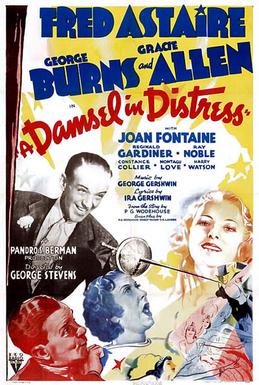
A Damsel in Distress is a 1937 American English-themed Hollywood musical comedy film starring Fred Astaire, George Burns, Gracie Allen and Joan Fontaine. Loosely based upon P.G. Wodehouse's 1919 novel of the same name and the 1928 stage play written by Wodehouse and Ian Hay, it has music and lyrics by George and Ira Gershwin. The film was directed by George Stevens, who had also directed Astaire in Swing Time (1936).

Bed of Roses is a 1933 pre-Code romantic comedy film co-written and directed by Gregory La Cava and starring Constance Bennett. The picture was released by RKO Radio Pictures with a supporting cast featuring Joel McCrea and Pert Kelton.

Helen Marie Twelvetrees was an American actress. She starred in Hollywood films in the sound film era from 1929 to 1939. Many of her roles were of "suffering women,” which reflected her tumultuous personal life. She has a star on the Hollywood Walk of Fame located at 6263 Hollywood Blvd.

The Three Musketeers is a 1948 film directed by George Sidney, written by Robert Ardrey, and starring Gene Kelly and Lana Turner. It is a Technicolor adventure film adaptation of the classic 1844 novel The Three Musketeers by Alexandre Dumas.
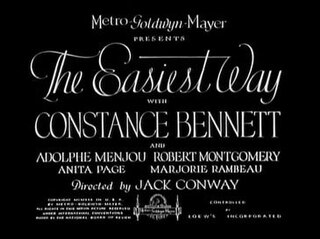
The Easiest Way is a 1931 American pre-Code MGM drama film directed by Jack Conway. Adapted from the 1909 play of the same name written by Eugene Walter and directed by David Belasco, the film stars Constance Bennett, Adolphe Menjou, Robert Montgomery, Marjorie Rambeau, Anita Page, and Clark Gable
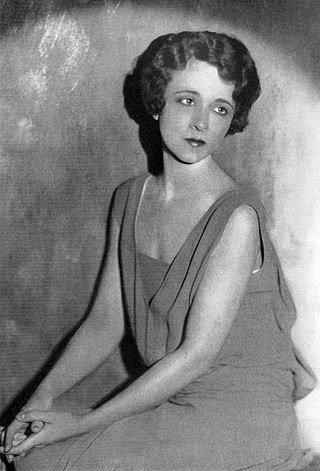
Bergetta "Dorothy" Peterson was an American actress. She began her acting career on Broadway before appearing in more than eighty Hollywood films.
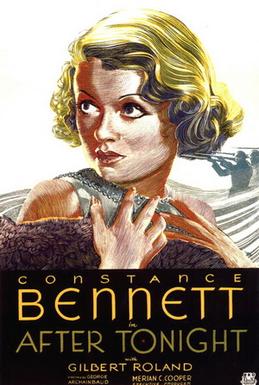
After Tonight is a 1933 American pre-Code World War I spy film directed by George Archainbaud and starring Constance Bennett and Gilbert Roland. The studio considered firing Bennett after the film lost $100,000 at the box office.

The Impatient Maiden is a 1932 American pre-Code drama film directed by James Whale, starring Lew Ayres and Mae Clarke, and released by Universal Pictures. The screenplay was written by Richard Schayer and Winifred Dunn, based on the novel The Impatient Virgin, by Donald Henderson Clarke.

Rockabye is a 1932 American pre-Code drama film starring Constance Bennett, Joel McCrea, and Paul Lukas. The final version was directed by George Cukor after studio executives decided that the original film as directed by George Fitzmaurice was unreleasable. The screenplay by Jane Murfin is based on an unpublished play written by Lucia Bronder, based on her original short story.

The Three Musketeers is a 1935 film directed by Rowland V. Lee and starring Walter Abel, Heather Angel, Ian Keith, Margot Grahame, and Paul Lukas. It is the first English-language talking picture version of Alexandre Dumas's 1844 novel The Three Musketeers.

She Wanted a Millionaire is a 1932 American pre-Code romantic drama film starring Joan Bennett and Spencer Tracy. The film, produced and distributed by Fox Film Corporation, was directed by John G. Blystone and also features Una Merkel. It is the only film that Bennett and Tracy made together in which she was billed over Tracy. They also played the top-billed romantic leads in Me and My Gal (1932), Father of the Bride (1950), and Father's Little Dividend (1951).

The Common Law is a 1931 American pre-Code romantic drama film directed by Paul L. Stein, produced by Charles R. Rogers and starring Constance Bennett and Joel McCrea. Based on Robert W. Chambers' 1911 novel of the same name, the film was the third film adaptation of the book, and the first during the sound-film era. It was received well both at the box office and by film critics, becoming one of RKO's most financially successful films of the year.
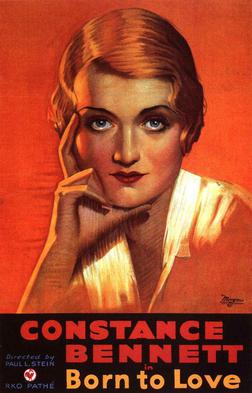
Born to Love is a 1931 American pre-Code melodrama film, directed by Paul L. Stein from an original screenplay by Ernest Pascal. It starred Constance Bennett, Joel McCrea and Paul Cavanagh in a lovers' triangle set in London during World War I. It was only the second film produced by RKO Pathé after the merger of the two studios, and according to RKO records, it made a profit of $90,000.

Sin Takes a Holiday is a 1930 American pre-Code romantic comedy film, directed by Paul L. Stein, from a screenplay by Horace Jackson, based on a story by Robert Milton and Dorothy Cairns. It starred Constance Bennett, Kenneth MacKenna, and Basil Rathbone. Originally produced by Pathé Exchange and released in 1930, it was part of the takeover package when RKO Pictures acquired Pathé that year; it was re-released by RKO in 1931.

This Reckless Age is a 1932 American pre-Code comedy film directed by Frank Tuttle and starring Charles "Buddy" Rogers and produced and distributed by Paramount Pictures. The film is based on a Broadway play The Goose Hangs High by Lewis Beach.
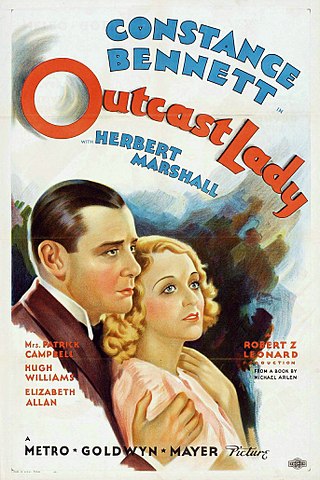
Outcast Lady is a 1934 American romantic drama film directed by Robert Z. Leonard and produced and distributed by Metro Goldwyn Mayer. The film stars Constance Bennett, Herbert Marshall and Mrs. Patrick Campbell. It is a sound version of Michael Arlen's 1924 novel The Green Hat, filmed in 1928 by MGM as A Woman of Affairs with Greta Garbo and John Gilbert.



















